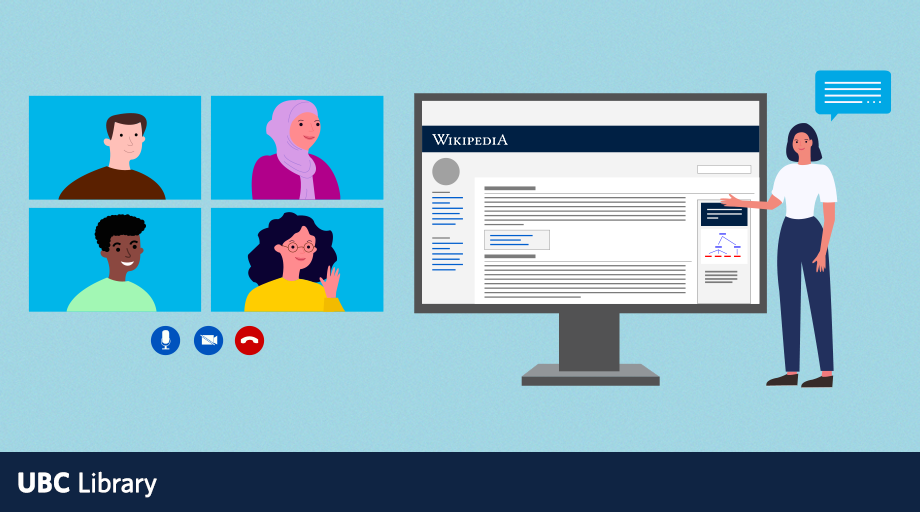 Before the switch to remote learning, undergraduate students in LING 300 Studies in Grammar would make the trek from Totem Field Studios to the second floor of Koerner Library to start researching their term project with the help of Susan Atkey, Reference Librarian in the Humanities and Social Science Division. Now, they go online.
Before the switch to remote learning, undergraduate students in LING 300 Studies in Grammar would make the trek from Totem Field Studios to the second floor of Koerner Library to start researching their term project with the help of Susan Atkey, Reference Librarian in the Humanities and Social Science Division. Now, they go online.
Dr. Rose-Marie Déchaine, Associate Professor in the Department of Linguistics, teaches the LING 300 course twice a year and gives students the option to select their final activity for the course: taking the exam or developing a Wikipedia page on a topic related to syntax, either solo or as part of a small research group.
As an open education initiative, the LING 300 Wikipedia project has translated well to the remote learning environment currently in place at UBC, and the support provided by UBC Library and the Centre for Teaching and Learning Technology (CTLT) has facilitated that transition. But the current success of the project is the result of a long, iterative process that required collaborative effort and a pioneering mindset.
“If I was mentoring anyone to do these types of projects, the first advice I would give is to learn what the implicit and explicit norms are for the different communities that you’re bringing together,” says Dr. Déchaine, noting that the project had to balance what was essentially a cross-culture environment that spanned three different learning cultures: UBC, the Wikipedia community, and the students themselves.
Dr. Déchaine first introduced the project into her class in 2013, a time when some university instructors were still prohibiting students from using content from Wikipedia. But as the project has evolved over the last eight years, so have attitudes towards open platforms such as Wikipedia. She cites the strong support from the Department Head of Linguistics, Dr. Bryan Gick, and the advice she received when reaching out to UBC’s 3M Fellows as key to her success in overcoming the challenges she faced.
“It is often the case when you’re doing something innovative or new, that is outside of the normal way people are used to doing things that you can see a negative return,” says Will Engle, Strategist for Open Education Initiatives at CTLT, who worked with Dr. Déchaine at the start of the project. “Wikipedia assignments can be—out of anything I’ve ever done—one of the more complex and most difficult course activities for instructors and students. Anytime you’re doing work in the open, your students are having to put their work, thoughts and experiences out there for other people to review and criticize. And that’s daunting for anybody. But it can also be really rewarding and valuable – such assignments enable students to contribute knowledge directly to a widely used resource and they learn important scholarly and digital literacy skills by doing so.”
Initially the project was introduced as a mandatory part of the course, which was generally unpopular with students. “When I finally started making it a choice, where students select one of two final activities for the course, they are able to self-select whether they are even comfortable with that [open] environment,” says Dr. Déchaine.
Students who do opt to complete the project are directed to search out and make an appointment with Atkey, whose role as a liaison librarian is all about connecting UBC faculty, students and staff with the materials they need.
“We use reference sources such as the Oxford Bibliographies Online as starting points to get the students going on a topic as they overview the key authors, foundational works and criticisms on their specific linguistic topic. Then we find the core texts in the UBC Library catalogue and in Google Scholar using cited reference searching to see how the work has been built on and how a theory has developed over time,” says Atkey.
Connecting through video conferencing apps like Zoom has streamlined the library consultation process for Atkey by making it easier to share links and screens during her sessions with students. Since it’s also easier to jump on a video call than visit the physical library branch on campus, more students have also taken the opportunity to access these liaison services than in previous years.
“I think these open learning environments are absolutely critical to creating citizens of the 21st century, and that universities have an important role to play,” says Dr. Déchaine.
Learn more about key linguistics resources and related resources on Aboriginal languages available at the library or contact your subject librarian.